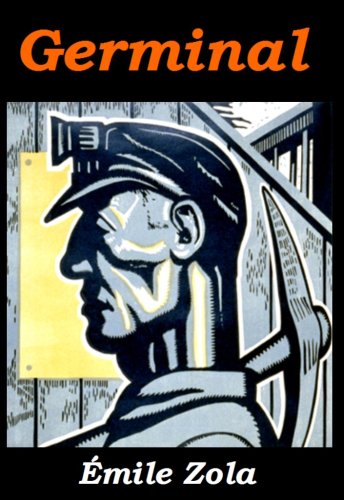 This is the story of a working-class community of miners living with and fighting against the cycles of poverty and oppression that consume them. We quickly become aware of this cycle, as low wages and frequent pregnancies wash over the people with the consistent and inescapable pull of the tide. The protagonist is Etienne, a young man who has fallen from his higher class position into this role as a miner. Despite their cultural differences, the miners eventually welcome Etienne into their community, recognizing that his hard work and earnest heart overshadow the traits he lacks. He moves in with the Maheu family, where he befriends their daughter Catherine, and falls in love with her amid a messy love triangle. Their sexual tension burns through the pages, offering a hint of innocent purity in the midst of rampant promiscuity.
This is the story of a working-class community of miners living with and fighting against the cycles of poverty and oppression that consume them. We quickly become aware of this cycle, as low wages and frequent pregnancies wash over the people with the consistent and inescapable pull of the tide. The protagonist is Etienne, a young man who has fallen from his higher class position into this role as a miner. Despite their cultural differences, the miners eventually welcome Etienne into their community, recognizing that his hard work and earnest heart overshadow the traits he lacks. He moves in with the Maheu family, where he befriends their daughter Catherine, and falls in love with her amid a messy love triangle. Their sexual tension burns through the pages, offering a hint of innocent purity in the midst of rampant promiscuity.Throughout this process, the injustice of the miners' lifestyle pulses as the undercurrent of the story. We catch glimpses of the wealthy upper crust as they collect from the miners without investing a fraction of their effort. Even within the community, we see the families who have money take advantage of those who do not. We watch the miners suffer physical, mental, and sexual abuse in their gritty attempt to keep living. We observe traces of hope float in among them only to be blown out of their reach. Their crisis steadily builds upon their labored shoulders, as one breaking point leads to another. There is not one single event that pushes them into chaos, but a growing desperation forces out their other options. They're determined and rash, stubborn and hopeful, generous and terrible. Yet all of their emotions become painfully suffocated as their situation becomes increasingly dire.
Zola was able to make the descriptions and emotions so raw and realistic because he immersed himself in a mining community to research it. The strength of this novel lies in its suffering people and their fierce desire to keep living despite the increasingly heart-breaking circumstances. Their struggle is at times clumsy and at times brilliant, and Zola manages to polish it off with the faint sound of hope ringing in the distance. Germinal's revolutionary and desperate spirit is akin to other stories of French revolt, such as Les Miserables and A Tale of Two Cities. However, this novel was the 13th in a 20 volume series, though it has far outshone all of Zola's other writing since its original publication in 1885. If, like me, you were waiting for someone to give you an extra push to pick up this piece of wonderful French literature, I hope my brief discussion does the trick. You won't regret it.

3 comments:
I'm so pleased you liked this! It is an amazing book. And yes, well-researched. For each book, Zola used to produce a kind of "dossier" divided into three sections: sketch, characters, and milieu. The books are amazingly researched. He even consulted medical journals for Germinal.
Anyway, yes, happy you enjoyed it! It's one of my favourites :)
This was my first Zola, too. I did not agree with his argument, but I love his writing so much that I am preparing to begin the whole series from the very beginning soon. I needed a breather after Germinal.
Germinal reads as if it was written last week since it is alive with all the human emotions. It is one of the best books ever written and will always live. Vive la France! Vive Emile Zola!
Post a Comment